#Unlawful Detainer Florida
Text
Martin County Eviction Attorneys | 561.699.0399
Martin County Eviction Lawyers
If you’re a property owner in Martin County, Florida, grappling with tenant problems, consider Law Office of Ryan S. Shipp, PLLC for reliable legal support. Our seasoned team specializes in both residential and commercial evictions, adept at handling the nuances of landlord-tenant law and delivering prompt, effective solutions.
Why Opt For Shipp Law For Eviction…

View On WordPress
#chapter 83 Florida Statutes#commercial eviction help#evicting a tenant#eviction legal advice#eviction notice Florida#eviction proceedings Florida#eviction services#eviction summary procedure#expert eviction lawyer#fast eviction services#Florida Commercial Eviction#florida eviction process#florida landlord rights#landlord legal support Florida#landlord services attorney#landlord tenant attorney near me#landlord tenant law#lease agreement violations#legal help for landlords#Martin County eviction attorney#Martin County residential eviction#Non-payment of rent#professional eviction process#property management legal aid#residential eviction lawyer#tenant dispute resolution#tenant eviction assistance#tenant eviction lawyer#tenant law expert#Unlawful Detainer Florida
0 notes
Text
https://www.aphis.usda.gov/news/program-update/plant-protection-today-florida-couple-successfully-prosecuted-lacey-act

Last month, the U.S. Department of Justice (DOJ) announced the successful criminal prosecution and sentencing of a Florida couple and their employee in violation of the Lacey Act and customs law. Noel and Kelsy Hernandez Quintana pleaded guilty and were both sentenced to close to 5 years in prison for illegally importing and selling between $25 million and up to $65 million worth of plywood products.
They were ordered to pay approximately $42 million in forfeitures and an additional $1.6 million to cover storage costs incurred by the government when the Quintanas declined to abandon seized illegal wood, thus forcing the government to maintain the wood in storage pending resolution of the case. The couple’s employee, Marta Angelbello, was also detained and sentenced in relation to the case, receiving 3 years of probation with 90 days of home detention and a fine of $3,000.
The Lacey Act Team was first enacted in 1900, to combat trafficking of illegally taken wildlife, fish, or plants. In 2008, Farm Bill brought about amendments that strengthen protections to a broader range of plants and plant products, making it unlawful to import certain products without an declaration. This might be considered one of the harshest judgements since the Act was amended. After the prison sentence, the Quintanas are required to serve three years of supervised release following their prison sentences, during which time they are prohibited in engaging in businesses importing or exporting products protected under the Lacey Act.
5 notes
·
View notes
Text
Key Tips When Facing Police Questioning in Florida

Maintain a calm and respectful demeanor during police interactions.
Remember your right to remain silent and exercise it when necessary.
Having legal representation during questioning is your right.
Refrain from providing information without your lawyer present.
You deserve to know the grounds for your questioning.
If you're not under arrest, you can inquire if you're free to go.
Your statements can be used against you in legal proceedings.

Introduction: Understanding Your Rights During Police Questioning in West Palm Beach, Florida
Facing police questioning, especially without prior knowledge of your rights, can be intimidating. Floridians, like all US citizens, have distinct rights when law enforcement officers approach them. Being well-informed about these rights can be a significant safeguard during such encounters.

Your Entitlement to Silence: The Essence of the Miranda Warning
The Miranda Warning, a result of the notable Miranda v. Arizona case, upholds your right to remain silent. When subjected to questioning:
Law enforcement officers should inform you about this right.
Opting for silence cannot be used against you in a court of law.
Choosing to speak may waive this right temporarily, but you can reassert your right to silence subsequently.
Tip: Clearly state your choice to remain silent if you decide to.
Tip: Always think before answering questions, especially without a legal representative.

The Significance of Legal Counsel During Interrogation
The law entitles you to have an attorney during interrogations. As per the Florida Statutes:
If financial constraints prevent you from hiring one, the state ensures a public defender.
Interrogation must pause once you request an attorney.
An attorney's presence during questioning helps safeguard your rights.
Tip: Promptly express your desire for an attorney if you feel uneasy.
Tip: Prioritize consulting your attorney before replying to inquiries.

Being Informed About the Rationale for Your Interrogation
Law enforcement must have valid grounds for questioning:
A simple suspicion isn't ample justification.
There needs to be probable cause or reasonable suspicion.
Familiarizing yourself with the reason can influence your responses.
Tip: Politely seek the reason behind your questioning.
Tip: If uncertain, ask for clarification on the nature of the interrogation.

Recognizing When You Can Depart from the Interrogation Site
If you're not under arrest:
You're allowed to ask if you can leave.
Any detention should be justifiable.
Without substantial reasons, prolonged detainment can be unlawful.
Tip: Periodically verify your freedom to depart, particularly if you feel unnecessarily constrained.
Tip: Stay composed and convey your wish to leave if not under arrest.

The Potential Outcomes of Your Statements to the Police
During such interactions:
Be aware that your words can be meticulously analyzed.
Even offhand comments can carry legal consequences.
Approach with caution, considering the potential implications of your words.
Tip: Avoid spontaneously divulging information.
Tip: Monitor your language and demeanor, ensuring you don't unintentionally implicate yourself.

Hypothetical Scenario: Exercising Rights During Police Questioning
Jane was stopped in West Palm Beach for an expired registration sticker. The officer, spotting a baseball bat in her back seat, started questioning her about a recent incident at a nearby park. Armed with knowledge of her rights, Jane inquired if she was a suspect and the reason for her questioning about the incident. Receiving a vague response, she asked if she was free to leave. The officer, realizing he had no concrete grounds for detainment, allowed Jane to proceed without additional questions.

Key Insights from Encounters with the Police in Florida
Familiarizing yourself with your rights offers significant protection during police interactions.
Having legal representation is vital during official interrogations.
Keep reassessing the situation and be aware of when it's appropriate to stay silent or ask about leaving.
Always clarify the reason for the questioning.
Seeking a knowledgeable attorney ensures you have a dependable ally during any legal proceedings.

How Josh LeRoy Can Assist You During Police Interactions in Florida
Interactions with law enforcement often come with unpredictability and tension. Entrust your rights and welfare to Josh LeRoy of LeRoy Law. Familiar with the intricacies of Florida's legal landscape, Josh stands steadfastly by your side, ensuring you have the best defense possible during trying times.

Frequently Asked Questions (FAQ)
Do I have to respond to all police questions?
No. You can exercise your right to remain silent and only speak when you feel comfortable.
What if I cannot afford an attorney during questioning?
The state ensures you a public defender if finances are a concern.
Can police detain me without arrest?
Yes, but they need valid grounds. If not, you can inquire about your freedom to depart.
How do I assert my right to silence?
Clearly state your intention to remain silent.
How long can police detain me without formal arrest?
The duration must be reasonable. Unjustifiable prolonged detainment can be challenged legally.

Disclaimer: LeRoy Law tries to ensure the accuracy of this article. However, Florida Statutes change, case law changes, and as such, errors may occur. LeRoy Law assumes no responsibility for any errors or omissions in this article. LeRoy Law encourages you to utilize our links to relevant Florida Statutes. Contact my office at [561.290.2730] if you have any questions or require legal assistance.
#LeRoyLaw#JoshLeRoy#WestPalmBeach#WestPalmBeachCriminalAttorney#WestPalmBeachCriminalLawyer#FloridaPoliceRights#UnderstandingYourRights#WestPalmBeachLaw#QuestioningInFlorida#DefendingYourRights
0 notes
Text
Top 5 Reasons couples decide to Divorce
Marriages can be the most beautiful thing in the world, or the worst, depending on who you ask, but the truth is, that divorces are becoming increasingly common. In Florida, the divorce rate is among the highest in the U.S. at 13%, and it isn’t decreasing anytime soon. But why is that the case?
Since the adoption of the no-fault laws in divorce, in which couples can divorce if they just wish to do so, divorcing has never been easier. Because divorce has important legal consequences, it is not a decision to make lightly, so in this article, we’ll go over some of the main reasons why couples choose to divorce, often leading to a costly court battle.
These main reasons are:
1. Infidelity: this isn’t a shock to learn, since infidelity can be a breach of trust that leads to feelings of hurt, anger, and betrayal. Infidelity has always been a thing, but now it may be more prominent than ever mostly because of social media, and the rise of certain tendencies among young populations.
2. Communication problems: whether you’ve been married or not, you may agree that communication is probably the most important thing in a relationship. When couples struggle to communicate effectively, they may find it difficult to resolve problems, coordinate when making decisions together, or even connect emotionally. These issues may lead to frustration, resentment, and lack of intimacy, which end up taking a toll on the marriage.
3. Financial problems: This is not often talked about and yet it’s important to mention. Money is often a source of tension and stress in a relationship, and debt, overspending, or unequal incomes can negatively influence many aspects of the relationship. Couples who don’t share similar financial goals or who can’t agree on a budget often end up failing in making their marriage work.
4. Substance abuse: substance abuse can have a devastating impact on a relationship, causing not only trust issues, but also communication problems, financial issues, and a whole lot of other issues. A lot of people with addictions refuse to seek professional help, and a divorce may be necessary to protect the well-being of both parties as well as the children involved.
In conclusion, we know that divorces are difficult and painful processes, but they also might be necessary if the relationship isn’t working anymore. By understanding the most common reasons for divorce, couples can work on these issues early on to avoid any future tragedies.
Visit https://www.jjlawfl.com/unlawful-detainer-attorney-florida
https://www.jjlawfl.com
0 notes
Text
Aquino's Agrarian Reform

Journal #4
Land reform or Agrarian reform is about the distribution of land and property to the people especially the agricultural farmers and labourers. We were able to discuss the history of agrarian reform from the past and especially under the Presidents of the Philippines, and we had this question.
So how were the Aquinos able to keep their large track of land of more than 7 hectares?
Mrs. Aquino came from a family of very large landowners. Especially the Cojuangco family, which was one of the largest landlords in the country. With the irony, allegations on President Aquino say it is because of lack of commitment and political will on the program (CARP) due to the low budget and remittances. Furthermore, critics also say that she could have implemented a program because of her political powers after the revolution.
Also in her time, were the livelihood and agro-industrial programs were boosted to become effective and productive to transfer them into business people.
But despite of this, Aquino family managed to have a track of land of more than 7 hectares. These are the some reasons:
Reducing the size of land for distribution
There are two ways how the Cojuangco-Aquinos did this.
First is through the land survey. In the 05 July 2011 decision of the high court, the total number of hectares up for distribution should be 4,915.75 hectares. The DAR, however, arrived at the total land area of only 4,099 hectares, saying that it excluded residential areas, canals, roads, firebreaks, a cemetery, buffer zones, lagoons, fishponds, eroded areas, and legal easements.
In its petition before the high court, Ambala argued that the said areas – residential, canals, roads, firebreaks, a cemetery, buffer zones, lagoons, fishponds, eroded areas, and legal easements – had already been excluded from the coverage of the Comprehensive Agrarian Reform Law through the stock distribution option (SDO) scheme in 1989. Thus, it should not be deducted again from the lands up for distribution.
Ambala also said the conduct of the land survey was not transparent. In a previous Bulatlat.com story, Florida Sibayan, acting chairwoman of Ambala, said the DAR agreed to their request to oversee the land survey, but Ambala did not receive any notice. She said they were surprised to know that the survey had been completed.
Second is through Cojuangco-Aquinos-owned companies claiming ownership over hundreds of hectares of land.
Based on the initial documents gathered by the Unyon ng Manggagawa sa Agrikultura (Uma), the Tarlac Development Corporation (Tadeco) is claiming ownership over at least 461 hectares of land in the villages of Balete, Cutcut and Central.
According to the Sentro para sa Repormang Agraryo (Sentra), counsel for the Ambala, the SC decision directing the DAR to cover all agricultural lands of Hacienda Luisita for agrarian reform, included the land being claimed by Tadeco. Tadeco, Sentra said, has already divested its ownership of the subject land as all the agricultural lands of Hacienda Luisita were ordered distributed to the farmworkers.
In its complaint of unlawful detainer against the farmworker-beneficiaries, Tadeco alleged that the subject parcels of land are not covered by the agrarian reform program, but Sentra noted that the company did not attach any order for exemption or exclusion of the property from agrarian reform coverage as issued by the DAR. Sentra argued further that while Tadeco, in its complaint, stated that the subject lands are intended for future expansion into commercial or residential use, it also admitted that the lands are actually agricultural in use at present.
Moreover, in the memorandum issued by then Agrarian Reform Secretary Nasser Pangandaman on Dec. 23, 2005 ordering the distribution of the entire Hacienda Luisita to farmworker-beneficiaries, the lands being claimed by Tadeco were included.
Pangandaman’s order was pursuant to the Presidential Agrarian Reform Council Resolution No. 05-32-01 S. 2005 revoking the stock distribution option (SDO) in Hacienda Luisita.
The Hacienda Luisita Incorporated (HLI), not Tadeco, filed a temporary restraining order against the said PARC resolution.
In a notice of coverage recently issued by DAR and published in the Philippine Star, Dec. 12, at least 358.22 hectares of land being claimed by Tadeco in Balete and Cutcut villages are up for distribution.
2. Filing charges against farm workers, supporters
The Cojuangco-Aquinos, through its corporation Tadeco, filed charges of unlawful detainer against 81 farmers in Cutcut village and 21 farmers in Balete village for occupying lands being claimed by Tadeco.
In its motion to dismiss the charges against the farmers, Sentra argued that the complaint fails to aver facts constitutive of unlawful detainer. The counsel for the farmers also asserted that the present case is agrarian in nature and should be solved by the DAR or its adjudication board.
Supporters of the farmers were not spared from charges. On Sept. 17, eleven farmers and supporters, including Anakpawis Rep. Fernando Hicap, were arrested by elements of the local police. They were charged with illegal assembly, malicious mischief, illegal trespass, and direct assault. They were later released on bail and Hicap and Catholic nun Pat Fox were dropped from the charge sheet.
On Dec. 21, elements of Philippine National Police (PNP) Tarlac arrested eight farmers. The arrests ensued as farmers attempted to block a bulldozer from destroying more farm lots in Balete village.
3. Mobilizing military, police, security guards
In several instances, policemen and suspected soldiers aided the security guards hired by Tadeco in harassing farmers.
The Dec. 21 arrests were directly supervised by the Tarlac PNP Provincial Director Alex Sintin, and Tarlac City PNP OIC Chief Bayani Razalan.
According to Ambala and Uma, the Army’s 3rd Mechanized Battalion set up a military camp in Balate village.
References:
0 notes
Text
Eight-year-old Boy Kills Baby Girl with Father’s Rifle in US
Eight-year-old Boy Kills Baby Girl with Father’s Rifle in US
Last weekend in Florida, an eight-year-old boy was playing with his father’s rifle when he fatally shot a baby and injured the infant’s younger sibling, according to police.
According to Escambia County Sheriff Chip Simmons, the father, 45-year-old Roderick Randall, was detained and charged with concealing evidence, unlawful possession of a firearm, and culpable negligence.
The tragic event,…
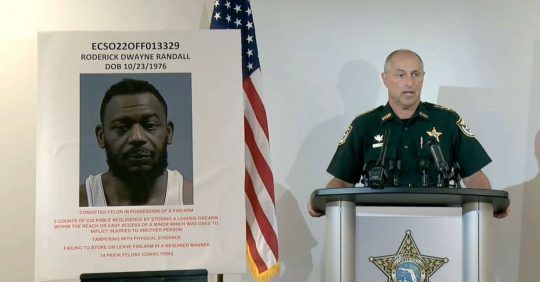
View On WordPress
0 notes
Text
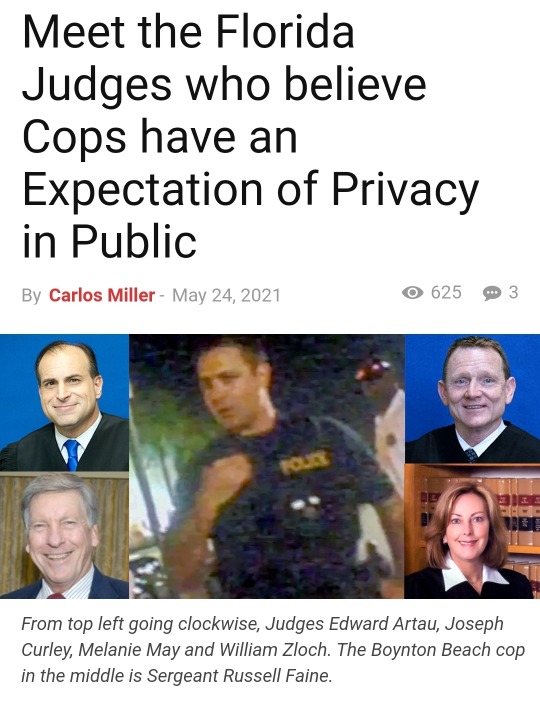
It was 2009 when PINAC News first broke the story of a mother named Tasha Ford who was arrested on felony “eavesdropping” charges for recording police detaining her teenage son in the parking lot of a South Florida movie theater after accusing him of trying to sneak inside without a ticket.
Ford’s arrest by Boynton Beach police was one of several high-profile arrests at the time on charges of eavesdropping or “wiretapping”; an unconstitutional trend in which cops across the country were using outdated felony laws to keep citizens from recording them in public.
Several landmark court cases since then have affirmed that citizens have a First Amendment right to record police in public which is one reason why we have been seeing so many police abuse videos in recent years. Turns out, they had a lot to hide during those early years.
But on May 5, the Fourth District Court of Appeals in Florida ruled the Boynton Beach cops who arrested Ford had a reasonable expectation of privacy and therefore had probable cause to arrest her, once again denying her the right to sue for damages. Ford first filed the lawsuit in 2010 but has since faced a string of judges who claim that cops have an expectation of privacy in public despite existing case law stating otherwise.
Ford’s video from that night should have ended the expectation of privacy debate because it shows the cops were standing in front of a bustling movie theater on a Saturday night as dozens of people stood or walked by. Some of the bystanders exchanged comments with the officers. One man even walked up and introduced his date to an officer while the cop tried to obtain Ford’s home address. The officer shook both their hands before resuming the conversation with Ford as if it were just another meet-and-greet community event.
But it does not appear as if Judges Edward L. Artau and Melanie G. May even watched the video, much less researched case law because they did not elaborate on their decision other than recite what was already stated in summary judgment from the lower court judge.
In his summary judgment under the heading “Undisputed Material Facts,”, Judge G. Joseph Curley described Ford as “confrontational” because she would not stop recording when ordered to do so. He also stated that she had “admitted” to recording the cops without consent as if confessing to a crime when the whole point of the lawsuit was that she was not committing a crime and had nothing to admit to because she never made it a secret that she was recording.
The summary judgment also claims that the cop’s friend who walked up and introduced his female companion also had an expectation of privacy, never mind the fact he was the one intruding into a conversation that had nothing to do with him.
The 2-1 ruling is already being challenged in an amicus brief filed Thursday by the ACLU, the National Press Photographers Association, the Society of Professional Journalists and several other First Amendment groups who predict cops in Florida will begin using the ruling to arrest anybody recording them in public as they’ve done in the past.
Below is an excerpt from the amicus brief which you can read here:
If allowed to stand, the panel majority’s opinion will license law enforcement officers to order citizens to stop recording the officers’ public discharge of their duties and to arrest all who refuse to comply for obstruction without violence. Like Ms. Ford, those individuals can hope and expect that sensible prosecutors will decline to charge, and sensible judges and juries will decline to convict, but they will nevertheless suffer the considerable consequences of an unlawful arrest, ranging from humiliation, degrading confinement, the cost of bail and defense counsel to the potential loss of employment and disruption to familial bonds, all captured by the popular culture saying, “you can beat the rap, but you can’t beat the ride.”
This Court should put an end to the practice by:
1. Granting rehearing or rehearing en banc;
2. Ruling that defendants lacked probable cause to arrest Ms. Ford;
3. Holding that recording police officers in the public discharge of their duties cannot create probable cause to arrest for wiretapping or for resisting without violence irrespective of whether ordered to stop recording; and
4. Holding that arguably rude speech unaccompanied by threats, incitement, or physical interference cannot give rise to probable cause to arrest for resisting or obstructing without violence.
The dissenting judge
It appears that the only judge who watched the video was dissenting Judge Martha Warner who has been on the bench since 1989 when she was appointed by then-Governor Bob Martinez. Artau was appointed to the bench last year by Governor Ron Desantis and May was appointed to the bench by Governor Jeb Bush in 2002.
Judge Warner not only watched the video and did her research, she explained her dissent in detail, citing a couple of the landmark cases that were made since Ford’s arrest. She also highlighted the viral George Floyd video from last year and the importance of being able to record police in public as you can read in the excerpt below.
I would hold that a law enforcement officer has no reasonable subjective expectation of privacy in conversations he has with the public or the arrestee in the performance of the officer’s duties in public places. They are performing a public duty at the time, and the public has a right to hear their words. This is as true today as it was in 2009.
A rule otherwise would mean that everyone who pulls out a cell phone to record an interaction with police, whether as a bystander, a witness, or a suspect, is committing a crime. Given how important cell phone videos have been for police accountability across the nation, I do not believe that society is ready to recognize that the recording of those interactions, which include audio recordings, are somehow subject to the officer’s right of privacy. If that were the case, then had the individual who recorded George Floyd saying to the officers “I can’t breathe” been in Florida, he would have been guilty of a crime.
The facts of this case seem to be only too similar to so many police encounters caught on video or cell phones. The officers had no reasonable expectation of privacy in their conversations while performing their public duties, particularly in public spaces. Given the prevalence of small video cameras and cell phones in public spaces, society has definitively come down on the side of approving the videoing of officers in the performance of their duties as a method of accountability. Because I conclude that the court erred in finding that the officers had probable cause to arrest the appellant for violation of the wiretap statute or for obstruction of the justice statute, I would reverse the final summary judgment and remand for further proceedings.
The Arrest
The arrest took place on February 28, 2009, a time when most people did not have video cameras on their phones. Not even the iPhone had a video camera at the time.
Ford, who had recently moved to South Florida from Washington DC, was at her mother’s house when she received a call from Boynton Beach police telling her to come pick up her son whom they said tried to sneak into a movie theater without purchasing a ticket.
Ford drove to the theater and began recording with her Canon Powershot as soon as she stepped out of the car. The cops immediately accused her of being “aggressive.” She responded by saying she was “passionate” about her son, especially after learning one of the cops slammed him against the car when he would not remove his headphones.
At no point did the cops whose names are Robert Kellman, Ricky Lauture and Russell Faine ever make an attempt to keep people from walking through the area where they had the teen detained while talking to his mother, which is a routine step when they want to keep their conversations private.
They just did not appreciate Ford questioning their authority as she recorded them which was not as common back then as it is today where there are now dozens of YouTube channels dedicated to doing just that. That is what made her aggressive in their eyes.
And that is what made her “confrontational” in the eyes of Judge Curley, a word that was also by the attorney of the cops in describing the incident to the judge, according to court documents.
Curley decided to weigh the evidence in summary judgment rather than let the undisputed facts speak for themselves as he is supposed to do.
Clueless judges
Judge Curley’s misunderstanding of the eavesdropping law probably comes from federal judge William Zloch who dismissed Ford’s federal lawsuit in May 2011 by claiming the cops had probable cause to arrest her because she had recorded them without consent.
Judge Zloch was probably in for a shock when less than three months later in August 2011, the landmark Glik vs. Cunniffe decision from the First Circuit Court of Appeals in Massachusetts affirmed that citizens had the right to record cops in public, contradicting his opinion on the issue.
The following year, ACLU vs. Alvarez out of the Seventh Circuit in Illinois was what finally put a stop to Chicago police arresting people on felony wiretapping charges for recording them in public.
But even before those landmark cases, the right to record police in public was already established in the 11th Circuit Court of Appeals, which includes Florida, with the case, Smith vs the City of Cummnig in 2000 which states citizens have a “First Amendment right, subject to reasonable time, manner and place restrictions, to photograph or videotape police conduct,” including a “right to record matters of public interest.”
The following is an excerpt from our original article on the arrest published on March 6, 2009 after we interviewed Ford by phone, less than a week after she was released from jail. It was a time when the mainstream media would ignore such arrests until they became impossible to ignore which is what happened here.
After pulling into the parking lot, she started filming as soon as she stepped out of her car.
“I saw my son surrounded by five officers and I started filming them, then I filmed the officer walking up to me,” she said.
Rather than stop to talk to the officer, she walked up to her son and asked him what happened. He told her that he had been tackled from behind by an officer and handcuffed after having been thrown out of the theater by a security guard.
“I kept asking the officers, ‘Was he aggressive? Did he pose a threat? I cannot perceive why you would want to put a child in handcuffs’,” she said.
But the officers seemed mainly concerned about the camera.
“They said ‘you can’t record people without letting them know’,” she said.
“So I said, ‘Ok, Tasha Ford is recording you’ and I continued filming them.
“I was filming them for my own protection,” said the mother of two who recently moved to South Florida from Washington DC. “I’ve seen the way cops interact with civilians down here.”
She said one of the officers, Robert Kellman, was extremely antagonistic towards her and told her son, “since your mother is such a fucking asshole, I’m going to arrest you for trespassing’.”
And then a supervisor arrived and when he noticed that she had a Maryland driver license, he allegedly told her, “you fucking northerners think you can come down here and mess with cops. You are about to get a lesson 101 on how to deal with Florida cops.”
The supervisor ordered her arrested under Florida’s electronic surveillance law, which is mostly applied to recording phone conversations without the other party’s consent.
In other words, it doesn’t apply to people who do not have a reasonable expectation of privacy.
But here we are 11 years later and the judges still don’t understand basic Constitutional law. Or perhaps they just don’t care.
After dismissing the federal claims over the eavesdropping charges, Judge Zlock kicked the case back down to the lower court to resolve the claim over the obstructing justice/resisting arrest charge which is really nothing more than a contempt-of-cop charge.
After her arrest, prosecutors wasted little time in dismissing both charges against Ford which should have bolstered her chances of suing police for damages but she had the misfortune of going before clueless or corrupt judges who ignore actual case law.
The amicus brief filed last week is requesting an en banc review which would bring the case up before the entire bench of 12 judges in the Fourth District Court of Appeals rather than just a panel of three. And the next step after that would be the Florida supreme court.
The case has never gone before a jury who would likely have a much different interpretation of the eavesdropping law than the bulk of judges mentioned in this article.
Ford vowed more than a decade ago that she would continue fighting this until she obtains justice so it is unlikely she is about to give up. Especially now that she has found an honest judge.
2 notes
·
View notes
Text
Listen up cowards
Please sign this.
This is a petition for the Trayvon Martin Law.
If you’ve forgotten who he was, then let me jog your memory a little.
Trayvon Martin was a 17-year-old boy visiting his father’s fiancée at the time of his murder.He was coming back from a gas station with skittles that he bought for his soon-to-be stepbrother when George Zimmerman, who was on neighborhood watch that night, had started following him in his car because he had labeled him as 'suspicious'.
Trayvon saw that he was being followed and began to run; Zimmerman reported this to an operator and got out of his car.A grown man was following an unarmed 17-year-old boy with a loaded, concealed weapon.
The ordeal ended with Trayvon's life being cut short.Zimmerman wasn't arrested the night of the murder because Florida Statute 776.032 States that a police officer cannot detain you or arrest you for shooting someone unless they have probable cause to believe the force you used was unlawful or if you shoot a police officer while they're in the act of performing their duties. Law Enforcement didn't arrest Zimmerman the night of the murder because they claimed they didn't have probable cause. (copied from the description of a petition because I feel that they explained it better than I could)
When he was finally interrogated, Zimmerman confessed to profiling Trayvon and following him. He couldn't even keep his story straight throughout police interrogations. The detective admitted that Zimmerman was an "overzealous vigilante who took the law into his own hands" and exaggerated his injuries.George Zimmerman was let go and claimed self-defense.
People worldwide marched and created petitions, and Zimmerman was arrested and convicted with 2nd-degree murder. But this battle for justice isn't over yet. A year after his conviction, a jury found him not guilty of 2nd-degree murder or manslaughter. Now, he's a free man.
Long story short: Trayvon Martin was profiled, followed and murdered by George Zimmerman and has yet to be served justice.
<<<<<<>>>>>>
This petition is so that this never happens again.
(this next part is copied directly from the petition)
This Petition calls for Florida Statute 776.041 (2) (A) to be redacted or revised.
776.041 (2) (A) allows an aggressor to use deadly force even though they started the aggressive act, confrontation or altercation.
776.041 Use of force by aggressor.—The justification described in the preceding sections of this chapter is not available to a person who:
(1) Is attempting to commit, committing, or escaping after the commission of, a forcible felony; or
(2) Initially provokes the use of force against himself or herself, unless:
(a) Such force is so great that the person reasonably believes that he or she is in imminent danger of death or great bodily harm and that he or she has exhausted every reasonable means to escape such danger other than the use of force which is likely to cause death or great bodily harm to the assailant; or
(b) In good faith, the person withdraws from physical contact with the assailant and indicates clearly to the assailant that he or she desires to withdraw and terminate the use of force, but the assailant continues or resumes the use of force.
Also, this Petition calls for the Neighborhood Watch Handbooks to be revised. The current handbooks aren't detailed enough and leave too much room for misinterpretation. The revised handbooks should include specific do's and don'ts for its members, and local or state laws that they must abide by while they're performing their duties. The revised handbook should also include rules that the Coordinator must follow. Not specifying these rules can lead a regular citizen to believe that they have the power to make Law enforcement decisions.
Most importantly, it calls for a new law to be made in Trayvon's name. A law that will prevent someone from claiming self-defense after they've done the following:
TRAYVON MARTIN LAW
1. Unless you are a member of Law enforcement, you are not allowed to chase an unknown person while you are carrying a concealed weapon. Unless that person has harmed you or they are attempting to cause bodily harm to you or someone else. Following, chasing or confronting an unknown person, who is in an authorized area or public area while you have a weapon waives your right to claim self-defense should said person end up dead. An aggressor carrying a deadly or concealed weapon can't claim self-defense if they follow, chase, or confront an unknown person who isn't in the act of committing a violent crime towards them or anyone else, and that person ends up dead. If you think said person is suspicious, contact law enforcement instead of taking the law into your own hands.
2. Unless you're a member of Law Enforcement; following, chasing or confronting someone who has not caused you bodily harm or attempted to cause you or someone else bodily harm, while you are carrying a deadly weapon will be considered an aggressive act in itself; because that act alone automatically puts said person in fear of their life. An aggressor carrying a deadly weapon enters the situation with more force than their victim has. Therefore they have an advantage over their victim who doesn't have access to the amount of force needed to stand their ground or protect themselves from the aggressor.
3. Following, chasing or confronting an unknown person while carrying a deadly weapon, should be seen as an aggressive or threatening act because you are putting that person in fear of their life. Also, you shouldn't be allowed to claim self-defense should that person end up dead as a result of the escalation of that act. Should that act lead to their death, you should be charged with the highest degree of murder applicable to you or manslaughter.
4. An adult carrying a deadly weapon waives their right to claim self-defense if they follow, chase, or confront an unknown minor, and that minor ends up dead or injured. Unless that minor has caused bodily harm to them or someone else or is attempting to cause bodily harm to them or someone else.
https://www.change.org/p/the-trayvon-martin-law-stop-this-from-happening-again-trayvonmartinlaw-blacklivesmatter?original_footer_petition_id=4496600&algorithm=promoted&source_location=petition_footer&grid_position=6&pt=AVBldGl0aW9uADuwEgAAAAAAXtqg9DzRhDsyNjg0NmRlOQ%3D%3D
(If you haven’t signed the petition for justice for Trayvon Martin you can do that here https://www.change.org/p/jeff-triplett-justice-for-trayvon-martin)
11 notes
·
View notes
Text
Former MPD officer in court for felony charges of misconduct
Aden, who alludes to the law as a "survey charge," accentuates that allies of this bill know that "Individuals of color are excessively poor in this nation or have abundance abberations when contrasted with White individuals," and they're mindful that "individuals with lawful offense feelings have an extremely difficult time landing positions." Therefore, she says it's almost incomprehensible for some previous criminals to pay the entirety of their fines and expenses so as to cast a ballot jobs that hire felons.
Among January and March of 2019, over 44% of previously detained Floridians who enlisted to cast a ballot were Black, as indicated by the Brennan Center for Justice. The normal pay of these earlier detained inhabitants who enrolled to cast a ballot during this time was almost $15,000 underneath that of the normal citizen in Florida. In 2018, Florida's middle family salary remained at $55,462, as indicated by the Census Bureau.
Despite the fact that the fines and expenses related with a crime allegation fluctuate, it's assessed that a few criminals in Florida pay as much as $10,000 in fines. In certain states, similar to Alaska, fines for a lawful offense can be as much as $500,000. This expense is notwithstanding court and jury charges, with numerous states likewise including interest overcharges for criminals installment plans. In excess of 40 states, as indicated by The Atlantic, previous prisoners can be re-imprisoned on the off chance that they neglect to pay their charges.
Because of the death of the new Florida charge, the NAACP Legal Defense and Educational Fund, the American Civil Liberties Union, the ACLU of Florida and the Brennan Center for Justice recorded a claim in 2019 against the state, contending that the new law abuses the 24th Amendment, which restricts Congress or any state from forcing a "survey charge" on people who are qualified to cast a ballot.
On Friday, Sept. 11, 2020, six adjudicators from the eleventh U.S. Circuit Court of Appeals decided that the bill was not unlawful and that previous criminals in Florida will at present be legitimately expected to pay all fines and expenses before casting a ballot.
Electors line up to project their political race voting form at a Cobb County surveying station in Marietta, Georgia, October 13, 2020.
Elijah Nouvelage | Reuters
The historical backdrop of elector concealment and how it's being played out today
Florida's "survey charge" on previous criminals focuses to a bigger influx of new laws and approaches that target Black electors and different networks of shading, says Aden, who has affirmed before Congress about progressing demonstrations of citizen concealment.
"This is essential for our set of experiences, obviously," she says. "On the off chance that anybody comprehends our nation, it is established on this vision that solitary certain individuals ought to have a voice."
Before the thirteenth Amendment was passed in 1865, which nullified bondage and automatic subjugation, Black slaves were considered only three-fifths of an individual for tax assessment and portrayal purposes. After five years in 1870, Black men were conceded the option to cast a ballot when the fifteenth Amendment was sanctioned. Fifty years from that point forward, Black ladies were conceded the option to cast a ballot with the nineteenth amendment in 1920 creation it unlawful to disappoint somebody dependent on their sex. In any case, even with these laws set up, Black people were as yet hindered from casting a ballot because of Jim Crow laws that implemented befuddling proficiency tests and high survey charges on Black residents.
A long time later, on March 17, 1965, administrators presented the Voting Rights Act of 1965, which completely allowed Black individuals the option to cast a ballot. The demonstration came only 10 days after "Ridiculous Sunday" happened on March 7, 1965, where several individuals walked from Selma, Alabama to the state's capital of Montgomery to request casting a ballot rights for every single Black American, with a significant number of them being beaten and attacked by state troopers along the course.
The Voting Rights Act of 1965 is "one of the best bits of enactment in our set of experiences," says Aden, however the battle to maintain its securities proceed with today, particularly following the 2013 Shelby versus Holder Supreme Court choice.
"The Shelby choice immobilized the core of the Voting Rights Act, which we allude to as Section 5," she says. "This was the arrangement of the Voting Rights Act that said certain states and purviews, or locales inside them, needed to get pre-endorsed for each casting a ballot change before they could actualize it. Furthermore, every democratic change implies each surveying place change, any change to competitor capabilities, any change to qualification prerequisites, or whether you have to give an I.D."
The purpose of the law was to guarantee that minorities were not having their political force restricted, Aden clarifies. In 2006, Congress gathered a record enveloping in excess of 15,000 pages demonstrating that citizen concealment actually exists in numerous pieces of the nation.
Since the Shelby versus Holder choice in 2013, a few types of elector concealment have been on the ascent, including citizen cleanses — an imperfect cycle that should tidy up elector moves by erasing names from the elector enrollment arrangements of individuals who have kicked the bucket, moved or got ineligible to cast a ballot. In any case, in numerous states specialists accept that elector cleanses have frequently included erasing the names of qualified citizens.
1 note
·
View note
Text
A Month of Islam in America: June 2019
Another month, and another step forward for sharia in America as more censorship was exposed. A whistleblower leak confirmed that @Pinterest protects Muslims and censors any reference to “creeping sharia,” and many other non-liberal topics.
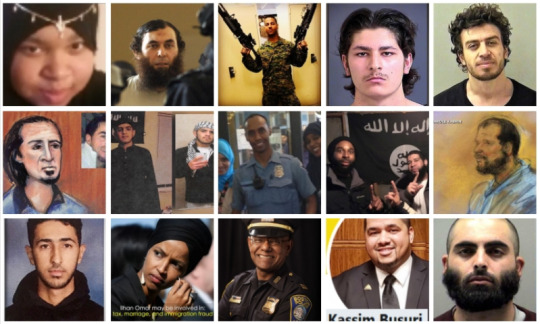
Click any link below for more details and link to original source.
Jihad in America in June
Brooklyn: Muslim Immigrant Sentenced to 20 Years for Attempting to Join Islamic State (ISIS)
Mohamed Rafik Naji was sentenced to 20 years’ imprisonment by United States District Judge Frederic Block for attempting to provide material support or resources to the Islamic State of Iraq and al-Sham (ISIS), a foreign terrorist organization. Naji pleaded guilty to the charge in February 2018.

Brooklyn: Muslim Woman Who Helped ISIS Gets 4 Years, But Will Be Out in 18 Months
With credit for time served, Sinmyah Amera Caesar will end up only serving about 18 months in prison after pleading guilty to charges accusing her of using social media to help recruit IS fighters under the nom de guerre “Umm Nutella.” She had also admitted violating a cooperation agreement with the government a — betrayal that infuriated prosecutors.

Illinois: Bosnian Muslim refugee and mother of 4 jailed for sending money, supplies to ISIS
Mediha Medy Salkicevic, a/k/a Medy Ummuluna, a/k/a Bosna Mexico, 39, was sentenced to 78 months in prison for conspiring to provide material support to terrorists.
Salkicevic, aka Medy Ummuluna and Bosna Mexico, espoused the ISIS philosophy that infidels should be killed and once said that unbelievers should be buried alive.
At the time of her arrest, she was working for an air cargo company at Chicago O'Hare Airport...

Illinois: Two Muslim converts convicted of aiding Islamic State (ISIS)
Joseph D. Jones and Edward Schimenti proudly waved a terrorist flag during a photo at a Lake Michigan park in Zion, had plotted to attack the Navy’s main U.S. training center near North Chicago and once had their eyes on planting an ISIS flag atop the White House.
Now Jones and Schimenti, both 37, have been found guilty of providing material support to ISIS.

Indiana: Yemeni Muslim who tried to join Islamic State terrorists gets 8 years in prison
U.S. District Court Judge Sarah Evans Barker handed down the 100-month sentence Friday afternoon in the case against 21-year-old Akram Musleh, U.S. Attorney Josh Minkler announced.
He admitted in the plea agreement that from about April 2016 through June 21, 2016, he offered himself to the Islamic State of Iraq and al-Sham, also known as IS, knowing it was a “designated foreign terrorist organization.”

Pittsburgh: Syrian Muslim Refugee Arrested for Planning Jihad Attack on Christian Church
Mustafa Mousab Alowemer, 21, a resident of Pittsburgh, Pennsylvania, was arrested today based on a federal complaint charging him with one count of attempting to provide material support and resources to the Islamic State of Iraq and al-Sham (ISIS), a designated foreign terrorist organization, and two counts of distributing information relating to an explosive, destructive device, or weapon of mass destruction in relation to his plan to attack a church in Pittsburgh.
“Court documents show Mustafa Alowemer planned to attack a church in the name of ISIS, which could have killed or injured many people...”

Ohio: Jordanian Muslim Immigrant Sentenced to 15 Years for Trying to Join Islamic State (ISIS)
A Dayton, Ohio man was sentenced today in U.S. District Court to 180 months in prison and 25 years of supervised release for attempting, and conspiring, to join the Islamic State of Iraq and al-Sham (ISIS).
Laith Waleed Alebbini, 28, was convicted following a bench trial in November and December 2018 before U.S. District Judge Walter H. Rice.
Alebbini attempted, and conspired, to provide material support and resources to ISIS in the form of personnel, namely himself.
Alebbini, a citizen of Jordan and a U.S. legal permanent resident, was arrested by the FBI on April 26, 2017, at the Cincinnati/Kentucky International Airport, as he approached the TSA security checkpoint.
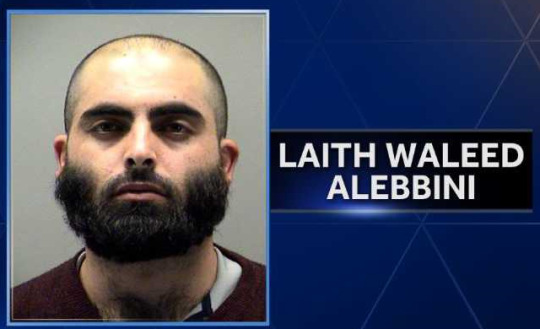
South Carolina: Muslim - twice convicted for attempts to join ISIS and kill Americans - gets 20-year prison sentence
A federal judge has sentenced a South Carolina man who tried to join ISIS to 20 years in prison.
Zakaryia Abdin, 20, pleaded guilty in September 2018. The Ladson man was arrested in March 2017.

New York: Bangladeshi Muslim immigrant arrested in Times Square terror plot
Ashiqul Alam was arrested Thursday after arranging through an undercover agent to buy a pair of semiautomatic pistols with obliterated serial numbers, prosecutors said. Police Commissioner James O’Neill said that development was “a clear indicator of (Alam’s) intent to move his plot forward.”
The defendant, a legal resident born in Bangladesh, moved to the U.S. as a child about 12 years ago...
He talked about wanting to “shoot down” gays, referring to them with a slur; using a “rocket launcher, like a huge one,” to cause havoc at the World Trade Center; and obtaining an enhanced driver’s license so he could walk onto a military base and “blow it up,” the documents said.
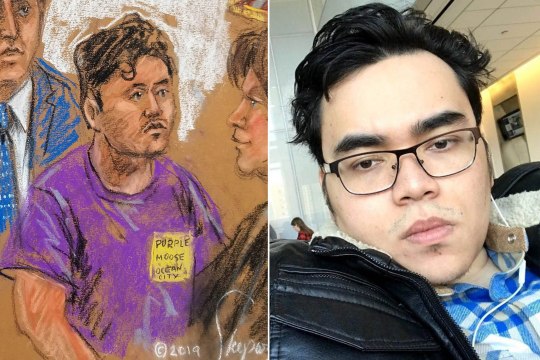
Illinois: Muslim Arrested for Threatening to Bomb Aurora Casino for Allah
A recently released affidavit and search warrant claimed that 30-year-old Musatdin M. Muadinov, while detained by police on Feb. 12, vowed to “pray to Allah” to “destroy the casino.” He further demanded to meet with President Donald Trump, saying that if his demands were not met, “we would all meet Allah,” according to the affidavit obtained by the Daily Herald.
Muadinov — who was dressed in what police described as “Muslim attire” when arrested — waived his right to remain silent.

More Jihad in America in June
Florida: Suspect sent bomb threats to judges ‘for cause of Islamic State’
Nebraska: Heavily armed Marine arrested trying to enter Air Force Base
Arizona: Muslim shared terror propaganda before attacking police officer
Brooklyn: Muslim in Jail for ISIS Support Pleads Guilty to Slashing Correctional Officer
South Carolina: Man who pledged allegiance to ISIS hid explosive device in teddy bear
Arizona: Witness in probe of 2015 Islamic jihad attack on free speech event convicted of lying to FBI
Libyan National Found Guilty of Terrorism Charges in 2012 Attack on U.S. Facilities in Benghazi
Iraqi Muslim who orchestrated jihad attack that killed 5 U.S. troops gets 26 years prison, then release to Canada
Immigration Jihad in America
Minnesota’s first Somali Muslim cop gets 12 years for murdering Australian woman
Minnesota: St. Paul’s first Somali Muslim city council member says criticizing his homophobic comments is… Islamophobic
New York: Brooklyn Mosque Blasts Islamic Call to Prayer to 20 Block Radius (VIDEO)
Somalis have Changed Minneapolis
New York: Thousands of Muslims take over two city blocks in Brooklyn to pray in the streets
Four Muslim ISIS suspects arrested in Nicaragua, likely headed for US
Islamization of America
Pennsylvania: 167-year-old Catasauqua church will become Islamic mosque
Pennsylvania: Former Easton church is now a Sunni mosque
Pennsylvania: Former daycare in residential Salisbury to become Muslim “community center”
Virginia: Residential home in Annandale to become a Muslim funeral home
Education Jihad in America
New Jersey Public School District to Students: “May Allah Continue to Shower You Love and Wisdom”
Maryland school fails Christian student for refusing Islamic prayer
New York: Cornell Univ. Muslim Students Demand More “Prayer Rooms”
Stanford administrators say advertising for conservative event threatens Muslim students
The Muslim Brotherhood’s Muslim Students Association: What Americans Need to Know
DOE Investigating Elite Colleges For Hiding Saudi, Qatari Cash from Regulators
Islamic Slavery & Sexual Jihad in America
Virginia: Three Muslim family members arrested for conspiracy, forced labor, and document servitude
Detroit Imam: Wife-Beating Serves to Remind Her That She Misbehaved (VIDEO)
Dhimmitude in Elected Office
Trump Admin Sues Greyhound for Banning Muslim Driver from Wearing Full Length Islamic Robe
Democrat majority passes defense authorization bill that funds transfer of remaining Gitmo jihadis to U.S.
Minnesota: City of Bloomington allows terror mosque to flout local laws (VIDEO)
Minnesota city council votes 5-0 to ditch Pledge of Allegiance (to avoid offending Muslims)
Diversity is our Strength Alert
Minnesota’s first Somali Muslim cop gets 12 years for murdering Australian woman
Minnesota: St. Paul’s first Somali Muslim city council member says criticizing his homophobic comments is… Islamophobic
Boston Police Dept’s First Muslim Captain Put On Administrative Leave Amid ‘Anti-Corruption’ Investigation
Minnesota: First Muslim congresswoman Ilhan Omar fined by state for unlawful use of campaign funds
Minnesota Muslim Rep. Ilhan Omar filed joint tax returns before she married husband
Fraud for Jihad
Connecticut: Muslim Grocery Store Worker Pleads Guilty in $3.2M Federal Food Stamp Fraud
Massachusetts: Muslim Restaurant Owner Pleads Guilty to Tax Fraud Conspiracy
That’s just what we had time to compile for just the month of June.
Far too many steps forward for the sharia, and only a few pushbacks, but worth noting:
New Jersey: School District Scraps Posters Calling upon “Allah” to “Shower” Students with Blessings After Threat of Lawsuit
Rather Than Go to Trial, Terror-linked CAIR Settles with the Victims They Defrauded
Tunisian Muslim who swore allegiance to ISIS removed from U.S.
New York: Albany mosque imam convicted of terrorism is deported back to Iraq
It’s almost midnight and Americans are losing their first amendment rights to sharia supremacists and the big technology, media and politicians who support them.
Please share this report before it’s too late.
65 notes
·
View notes
Text
Sixty fun & fascinating facts about the classic Supergirl (2 / 4)

Welcome to part two of a fun four part series to mark the sixtieth anniversary of the classic Kara Zor-El’s debut in DC Comics in May 1959 -- sixty fascinating facts, one for each year since her introduction.
Compiled below is the second set of surprising or unusual trivia super snippets about the original intrepid Argo City teen who leapt from that crumpled Midvale rocket ship. Covering her original Silver and Bronze Age incarnation, in comics and on screen, each factoid is calculated to intrigue and delight – hopefully even seasoned Kara fans will find a few morsels of trivia that had previously escaped their attention.
Enjoy…

16. She has a criminal record.
One of the nice things about being a superhero is that you get to smash up entire city blocks, throw large vehicles around with gay abandon, and generally cause billions of dollars worth of mayhem to major public infrastructure – all without consequence. That is, assuming you don’t do any of those things in San Francisco. In Adventure Comics #399 (Nov 1970) Supergirl detains some fleeing gangsters by using her super-strength to block the ends of a road bridge. At the story’s close, after dealing with urgent matters elsewhere, she returns to the bridge to be met by members of the San Francisco Police Department, who charge her with criminal damage to public property and obstruction of traffic. (The cops do at least thank her for capturing the gangsters, but only after they insist she fixes the bridge..!)
17. Her mother didn’t originally have a name.
The bond between Kara and her deceased Kryptonian mother is a big part of modern Supergirl mythos, but surprisingly when Supergirl was first introduced Kara’s mom played such a small role in her origin that writer Otto Binder didn’t even give her a name. In the original telling (and subsequent re-tellings) of Kara’s origin story, Kara’s mom was simply “Zor-El’s wife”. The name “Alura” first crops up in Action Comics #291 (Aug 1962), but subsequent stories couldn’t decide on a consistent spelling: one L or two(?) When reader Glen Chihara complained in Adventure Comics #384 (Sept 1969), DC standardised the name as Alura with one L. Readers then had to wait until Krypton Chronicles #3 (Nov 1981) for Alura’s full family name, Alura In-Ze, to be revealed in a Roots-inspired mini-series dealing with Superman’s family origins.
18. She was originally intended to be a major character in the Superman III movie.
Flushed with the success of the Christopher Reeve Superman movie, and with a sequel close to completion, producer Ilya Salkind started to sketch out a potential future direction for the movie franchise. His initial story outline for Superman III, penned in November 1980 then updated in March 1981, envisioned a tale centred squarely around romance -- romance between Superman and Supergirl..!
A flashback reveals another escapee from Krypton, a young Kara Zor-El, crash landing on Brainiac’s planet (”all black and sinister”), where she is raised to be his future bride. Preferring to seek romance elsewhere, the adult Kara flees to Earth, where her attempts to blend in among the locals are unsuccessful, drawing the attention of the Man of Steel. Kal-El falls in love with Kara, but their courtship is cut short when -- inevitably -- Brainiac shows up to claim his bride. Of course Superman wins the day, with help from Supergirl, and the movie ends with the suggestion that the cousins will likely marry.

19. It is against the law for her to marry Superman.
Around the world the law varies regarding whether cousins can marry, but Krypton law, it seems, has no such ambiguity. Action Comics #289 (June 1962) saw a young Kara play cupid by trying to find a love-match for her cousin. Naturally all her attempts fail. “If I ever did marry, it would be to someone super and lovable like... you!”, announces Kal-El as he looks deep into Kara’s eyes, “We can’t marry because we’re cousins! [...] We’re both from the planet Krypton, where the marriage of cousins was unlawful!”
(It is worth pointing out that, at the time the aforementioned tale was published, DC claimed Kara was only sixteen years old.)
20. Her Supergirl costume is super-flexible.
As the 1960s wore on, and DC allowed the Girl of Steel to age from a schoolgirl into a college student, Kara’s Linda Danvers identity took on a more contemporary look. Thanks to 60s fashions, this meant short sleeves and even shorter skirts. Inevitably fans started to ask how Kara could conceal her superhero attire beneath her increasingly diminutive mod wardrobe, prompting one of DC’s trademark ad hoc and post hoc explanations in Action Comics #342 (Oct 1966.) Her costume, it seemed, was super-flexible -- the sleeves could be rolled up tight to fit snugly under whatever swinging 60s threads Kara happened to be wearing at the time, even t-shirts.
21. She liked her men to be rugged.
The Silver Age was full of wonderfully strange stories, and the one featured in Action Comics #320 (Jan 1965) was no exception. Laying a trap for the Maid of Might, a genius in robotics named Skoll secretly scans Kara’s mind to create a perfect robot mate. The scans expose her various likes and dislikes, including the fact that young Kara has a thing for rugged looking men. An unwitting Supergirl falls in love with her manufactured mate, of course, but its robot programming is a little too good -- it exhibits genuine affection for Kara, causing it to betray Skoll and sacrifice itself to help Supergirl.

22. She owned two cats, both named Streaky.
Streaky the Super Cat arrived in the Supergirl canon just a few short months after the Girl of Steel’s comicbook debut. Readers had already begun to write in to DC to ask when Linda (Supergirl) Lee would be getting her own super pet like Superboy’s Krypto, and in Action Comics #261 (Feb 1960) DC obliged. The oft-impetuous Streaky was Kara’s faithful companion throughout her 1960s adventures, last appearing in Adventure Comics #394 (June 1970), after which writers simply forgot about him. What happened to the Feline of Fortitude is a mystery, but by Daring New Adventures of Supergirl #6 (Apr 1983) Kara seemed to be referring to Streaky in the past tense. During this issue Linda adopts a new stray cat (or was it the other way around?), christening her Streaky because, "she reminds me of a cat I used to own!"
23. Helen Slater auditioned for the role of Supergirl wearing a home-made costume.
As a test of invention and imagination, director Jeannot Szwarc asked all potential Supergirls to improvise a costume that symbolised their own idea of the Maid of Might. Slater rose to the challenge, quickly pulling together a basic superhero outfit that apparently wowed Szwarc: “She had improvised a costume with tights and sort of cloak. I just looked into those blue eyes, with that jaw-line and everything. She had it. There was just no contest with anyone else.”
24. Technically, she’s a cyborg.
In the early 1970s Supergirl narrowly dodged death when a treacherous boyfriend tricked her into drinking a potion that stole her super-powers, then lead her into an ambush of a hail of bullets. The Girl of Steel survived, but as a consequence she suffered from sporadic bouts of super-powerlessness for months afterwards. In Adventure Comics #402 (Feb 1971), scientists from the Bottle City of Kandor -- ever keen to help -- devised various bionic replacements to compliment Kara’s unreliable abilities, including an external exo-skeleton for strength, jet-powered boots for flight, and surgical implants to replicate some of her other former abilities. Eventually the effects of the potion wore off, and Kara’s true Kryptonian abilities returned, but there’s no record that she ever had the bionic surgery reversed.

25. Superman didn’t trust her with his secret identity.
Many fans agree that the Silver Age Superman was not always be nicest of guardians to the teenage Kara Zor-El, but even by the cruel standards of the time, the tale that unfolded inside Action Comics #258 (Nov 1959) was particularly harsh. Superman had thus far not trusted the secret of his dual identity to Kara. When Kara reveals her own identity to Krypto the Super Dog, Superman punishes her with banishment to an asteroid for a year. (Yes, a year!)
A crisis back on Earth, however, saw Kara return temporarily to help her cousin, after which Kal-El arranges a test to prove definitively that Kara can’t be trusted to keep her own (and therefore his) secret identity. His plan backfires, however, as not only does Kara manage to successfully protect her own dual identity, but in the process she exposes Kal-El’s own secret. Her cousin admits defeat, and Supergirl’s asteroid exile is rescinded.
26. She was a great student, but a lousy employee.
Kara’s everyday life during the Bronze Age can best be summed up as restless and volatile. She tried her hand at a variety of careers, but usually stormed out spectacularly after clashing with her bosses. Kara sought employment as a news camera operator in San Francisco, a student councillor in Santa Augusta (Florida), and a daytime soap actress in New York. Each time she quit in a fury, often uprooting herself to a new location to start afresh in the aftermath.
In-between her failed career attempts Kara returned to education. After quitting her camera operator job she enrolled on a Drama course at Vandyre University (San Francisco), and then after spectacularly abandoning her acting career she became a mature student majoring in Psychology at Lake Shore University (Chicago.) These bouts as a student seemed to be the only times that Kara was content with her life as Linda Danvers, although she never quite mastered balancing her private life with her duties as Supergirl.
27. The flying effects in 1984′s Supergirl movie were superior to the Superman movies.
Despite them wowing audiences, and making a whole generation believe that a man could fly, Jeannot Szwarc wasn’t happy with the flying effects done on the first two Superman movies. Szwarc, who directed Helen Slater’s Supergirl, recalled in a 1999 interview with Scott Michael Bosco: “They were very much in love with this guy who had worked on Superman, but I felt that what we wanted to do, the image quality was not sharp enough. It looked too fuzzy. The whole system relied on being able to use zooms and I don’t like zooms. I wanted to achieve a more graceful flying style.”
Szwarc instigated a re-engineering how the effect worked, and, after a lot of experimenting, was able to devise a new system of screen trickery to make his Girl of Steel swoop majestically over the Midvale landscape. The end result was so impressive, it even drew plaudits from Superman director Richard Donner according to Szwarc: “I know that when Sidney Furie was going to do Superman IV: The Quest For Peace he called Dick Donner for advice, who told him to talk to me because he thought the flying in Supergirl was unbelievable.“

28. She inspired the writing of the Wizard of Oz.
In a magical tale published in Adventure Comics #394 (June 1970), at a time that marks the borderlands between the Silver and Bronze Ages, Kara and Streaky are whisked by a tornado into a strange land. There they meet three other stranded characters: a robot, a cowardly monster, and a creature without any memory. To get home the five must journey into the Emerald Pyramid to find the Mysterious Motr of Doom. In the pyramid they encounter a human who was transported into this strange dimension from 1898′s Chicago. It is only after the adventure is over, and everyone is returned to their rightful time and place, that Kara reflects that the human she saved was likely L. Frank Baum, the author who would go on to write the Wizard of Oz books.
29. Her creation was inspired more by Fawcett Comics‘ Mary Marvel than Superman.
DC and Fawcett had famously engaged in a long and bitter legal battle during most of the 1940s over the character Captain Marvel (no, not Carol Danvers -- the character today known as Shazam!) At one point the lawsuit even threatened to see DC Comics stripped of its Superman copyright thanks to a legal slip-up by the syndicate handling Superman’s newspaper strips. By 1959 DC had come out on top and Fawcett had ceased to publish the so-called Big Red Cheese and all his spin-offs, including the character Mary Marvel, Captain Marvel’s superheroine sister.
But DC couldn’t help but note how popular the Marvel Family had been with both girls as well as boys -- at its height outselling even Superman. So, while looking for ways to revive flagging superhero sales, DC took a leaf out of Fawcett’s book by introducing their own version of Mary Marvel. They even assigned the former Fawcett Comics writer who had created Mary Marvel, Otto Binder, to work on her. The result was, of course, Supergirl !
30. She was actually created by Mort Weisinger.
The names most closely associated with the creation of Supergirl are, as every fan knows, writer Otto Binder and artist Al Plastino -- but are these two DC contributors the true originators of the Girl of Steel..? Interviewed in fanzine Comic Crusader #15 (1974), Otto Binder gave Martin Greim a glimpse into the true origin of the Maid of Might. “Mort [Weisinger] kept pooh-poohing Captain Marvel, saying it was a bunch of junk. Mary Marvel was a crazy idea! So, a couple of years went by and one day Mort said to me, ‘I’ve got a great idea! … Supergirl!’ Of course, I didn’t say, ‘You don’t mean Mary Marvel, do you Mort?’ To me, it was like reliving the past.”
So it seems it was Superman editor Mort Weisinger who invented the Girl of Steel -- Binder and Plastino deserve all the plaudits, of course, for turning Mort’s idea into a reality.

We’re half way through the sixty now. Remember to check out part three when it’s published for even more cool Kara content.
#supergirl#superhero#superman#comics#superheroines#dc#dccomics#karazorel#kara zor-el#silver age#bronze age
10 notes
·
View notes
Text
Eviction Services In Martin County, Florida - Law Office of Ryan S. Shipp, PLLC
Martin County Eviction Lawyers
Are you a landlord facing tenant issues in Martin County, Florida? Do you require legal assistance with residential or commercial evictions? Look no further than Law Office of Ryan S. Shipp, PLLC. Our experienced team concentrates our practice in navigating the complexities of landlord-tenant law and ensuring swift and effective resolution of your eviction…

View On WordPress
#commercial eviction services#eviction appeal lawyer#eviction attorney Martin County#eviction court representation#eviction hearing expert#eviction lawsuit assistance#eviction mediation services#eviction notice services#eviction process Martin County#fast eviction services#florida landlord rights#landlord lawyer Florida#landlord legal services Martin County#landlord-tenant court Florida#Law Office of Ryan S. Shipp#lease agreement violations#lease termination lawyer#Martin County property law#non-payment of rent lawyer#property damage claims#property management legal support#reliable eviction attorney#rent arrears attorney#renter eviction legal advice#residential eviction assistance#tenant dispute resolution#tenant eviction law#tenant law specialist#tenant removal legal help#unlawful detainer action Florida
0 notes
Text
U.S. Border Agents Apprehend 1,000 Migrant Children In 5 Days
U.S. authorities along the border with Mexico apprehended nearly 1,000 unaccompanied migrant children in the span of six days last week, as unauthorized crossings by minors continue to rise, according to government statistics provided to a federal court.
From November 18 to November 23, Customs and Border Protection (CBP) processed 997 migrant minors who traveled without parents or legal guardians, the agency’s top official, Mark Morgan, said in a court declaration Wednesday. More than 9,900 unaccompanied children have been taken into custody since September 8, Morgan added.
Within the next 120 days, CBP projects border crossings by unaccompanied minors to increase by 50%, according to the court declaration.
Morgan disclosed the figures as part of a Trump administration request for the D.C. Circuit Court to suspend a lower court order that currently prohibits border officials from expelling unaccompanied migrant children without a court hearing or an asylum screening. The outgoing Trump administration has argued that the policy, which it dubbed the “Title 42” process, is needed to prevent potentially infected migrants from spreading the coronavirus inside holding facilities and elsewhere in the U.S.
Last Wednesday, Judge Emmet Sullivan of the U.S. District Court in Washington, D.C. ruled that the public health law being cited by the Trump administration to expel border-crossers does not authorize expulsions or supersede legal safeguards for migrant minors — even during a pandemic. Sullivan ordered officials to stop expelling unaccompanied minors, but did not do the same for families with children or single adults, who continue to be expelled to Mexico or their home countries.
U.S. Border Patrol agents detain a 16-year-old undocumented immigrant minor from Mexico on September 10, 2019 in Mission, Texas.
/ Getty Images
In his declaration, Morgan said the uptick in apprehensions of unaccompanied minors is linked to last week’s court ruling, which he argued will “serve as a pull factor.”
Lee Gelernt, an American Civil Liberties Union attorney who has been challenging the border expulsions, pushed back on Morgan’s statements and predictions.
“The assertion that there will be a sharp increase in border crossings by children this winter is speculative at best, and in any event children can be safely tested and quarantined as needed,” Gelernt told CBS News. “There is simply no basis for the Trump administration’s claim that the cruel and patently unlawful Title 42 policy is necessary to protect public health.”
Apprehensions of unaccompanied migrant children along the U.S.-Mexico border, which plummeted to 741 in April, had been increasing steadily before Sullivan issued his order. In September and October, CBP agents apprehended 3,883 and 4,764 unaccompanied minors, respectively.
The U.S. Office of Refugee Resettlement, where most unaccompanied migrant children were sent before the pandemic, is now housing more than 2,300 minors in its network of shelters, an increase from a decade-low early in the summer, when the in-custody population dropped below 800.
Migrant minors transferred to the refugee agency stay in shelters or other housing facilities until they are placed with a sponsor, who is typically a family member residing in the country. U.S. law allows them to request asylum or other forms of humanitarian refuge to stop their deportation proceedings.
After receiving 162 children between April and June, the Office of Refugee Resettlement received 1,218 and 1,530 migrant minors from border officials in September and October, respectively.
While the refugee office has space to house approximately 13,000 minors, less than 8,000 beds are available because of Covid-19 mitigation policies, Nicole Cubbage, the agency’s acting director, said in a declaration accompanying the Trump administration’s appeal of Sullivan’s ruling. Cubbage said her office expects shelters along the southern border to reach maximum capacity on December 12, and the entire nationwide bed space for migrant children to be depleted by early January.
If the trend holds, Cubbage said the refugee agency would need to reopen “influx facilities” in Homestead, Florida and Carrizo Springs, Texas, to house hundreds of migrant youth. Cubbage said her office could start receiving between 300 and 400 children daily in “the near future,” a prediction she attributed to Sullivan’s order, “deteriorating economic and political conditions” in Central America, the impact of recent hurricanes, seasonal patterns and even President Trump’s electoral defeat.
“I am concerned that the recent upward trend in referrals noted above could represent the cusp of a major influx of UAC,” Cubbage wrote, using an abbreviation for the government term, “unaccompanied alien children.”
Detention periods for migrant children are also increasing. In September and October, 71 minors spent more than three days in Border Patrol custody, according to government statistics provided to lawyers representing detained migrant children.
According to the data, a three-month-old apprehended with at least one parent was held by CBP for two weeks. In October, a 17-year-old unaccompanied teen was in CBP custody for 18 days. In court declarations filed earlier this week, several children interviewed by a lawyer alleged having limited access to soap and face masks, and denounced lax social distancing measures and crowded conditions in CBP facilities.
“My mask is dirty on the inside. Here, people do not practice social distancing,” an eight-year-old child said, according to one of the declarations.
Another minor, a 15-year-old from El Salvador, said: “I was detained in a room with thirty other minors and we were cramped. I felt uncomfortable because there were so many people in the room. I had to sleep in a sitting position because there were so many people in the room.”
CBP did not address these allegations, citing pending litigation.
A 2008 anti-trafficking law requires CBP and other agencies to transfer unaccompanied minors to the refugee office within 72 hours of apprehending them, absent extraordinary circumstances. “Failing to lawfully transfer these children in time is simply negligent,” Democratic lawmakers led by Hispanic Caucus chairman Joaquin Castro wrote in a letter this week to acting Department of Homeland Security secretary Chad Wolf.
Neha Desai, one of the lawyers representing migrant youth in the court case over the Flores Settlement Agreement, which governs the care of minors in U.S. immigration custody, said the government needs to take more steps to quickly transfer children out of CBP custody. “Having children detained in CBP custody for any amount of time exposes them to a dangerous and traumatic environment,” Desai told CBS News. “This was true well before the pandemic and is even more so the case now.”
On Wednesday, CBP announced it would be closing its largest temporary detention facility for migrant families and children until renovations are completed in early 2022. The Central Processing Center in south Texas, opened during the Obama presidency, became notorious for its chain-link sections, which were denounced by advocates as “cages” when the Trump administration systematically separated thousands of migrant families in 2018. The announcement was first reported by The Washington Post.
The increase of border crossings by children, and of overall apprehensions, could prove to be an early and thorny immigration policy test for the incoming Biden administration. President-elect Joe Biden has vowed to discontinue many of Mr. Trump’s border programs, including a policy that has required tens of thousands of asylum-seekers from Central America, Cuba and other Latin American countries to wait in Mexico for their U.S. court hearings.
Mr. Biden’s team has also pledged to review the expulsions policy to ensure border-crossers “have the ability to submit their asylum claims.”
Andrew Selee, president of the non-partisan Migration Policy Institute, said ending the “Remain in Mexico” program and the expulsions too quickly could lead to a surge in border crossings. He suggested the incoming Biden administration could end Remain-in-Mexico but temporarily retain the expulsion policy, a scenario that could be complicated by legal challenges and reportingthat shows public health officials were pressured by the White House to authorize the expulsions.
Selee said an influx in border arrests could hurt chances of a divided Congress passing immigration legislation, including one that provides a pathway to U.S. citizenship for Deferred Action for Childhood Arrivals (DACA) beneficiaries. Republicans lawmakers blamed the DACA program for a surge in border apprehensions of Central American children in 2014, even though the policy, established in 2012, did not benefit new arrivals.
Before completely ending Mr. Trump’s policies, Selee said the incoming Biden administration should deploy more asylum officers, surge resources to the border and expand case management programs that allow migrants to complete their U.S. immigration proceedings outside of detention centers. Otherwise, he added, a sharp increase in unauthorized migration could leave the U.S. government unprepared, worsen conditions in temporary migrant holding facilities and lead to more draconian enforcement policies.
“You’re stuck between a rock and a hard place: Either you start releasing people in the general population or you hold them in the middle of a pandemic,” Selee said.
“If you try to be the anti-Trump on day one, you will end up acting like Trump in the end,” he added. “If you try and throw out everything Trump has done on day one, without having an alternative in place, you’ll end up doing the same things Trump did.”
Article Source
0 notes
Text
Florida prosecutor's office stops pursuing most resisting arrest cases, causing concerns for local police
New Post has been published on https://appradab.com/florida-prosecutors-office-stops-pursuing-most-resisting-arrest-cases-causing-concerns-for-local-police/
Florida prosecutor's office stops pursuing most resisting arrest cases, causing concerns for local police
Police have used resisting arrest charges to stifle protests and free speech, said State Attorney Aramis Ayala, whose jurisdiction covers almost 1.8 million people in Orange and Osceola counties.
“I would not be surprised if there was an attempt for some type of political gratification, but I’m just defining alternative methods of prosecution,” she told Appradab.
Officers undermine public safety when they bring “the force of our criminal justice system to bear against nonviolent citizens who are simply promoting the change our society so desperately needs,” her policy, announced Tuesday, says.
Abuse of power is another factor, she said. Especially when dealing with African Americans, police too often charge people with resisting arrest as a retaliatory measure or to cover up their own misdeeds, she said.
Under the policy, most people charged with nonviolently resisting will be ordered to watch a 30-minute video on the importance of obeying police. Offenders who have been arrested in the previous six months for resisting arrest will be prosecuted normally, the policy says.
Data shows that between September 2019 and September 2020 police charged Black residents with resisting arrest almost twice as often as other demographics combined, despite African Americans making up less than 21% of the counties’ populations. The contrast could be starker for people of color in general, Ayala said, but her arrest data doesn’t differentiate between White and Hispanic.
Prosecuting the cases encourages disproportionate policing, saps needed resources, creates trauma and long-term economic hardships and fosters distrust in the legal system, the policy says.
While research shows correlations between public trust and public safety, Ayala said, there’s nothing that indicates prosecuting nonviolent resisting arrest charges leads to less crime.
“There is absolutely no research that supports the nexus,” she said, “between a person who is arrested for resisting an officer without violence and future criminality.”
Other cities, including Chicago, New York and San Diego, reportedly have had similar racial disparities in resisting arrest charges, and some prosecutors have taken steps similar to Ayala’s. But Ayala believes hers is the nation’s most sweeping, she said.
‘It’s a bad decision’
Ayala’s team will still pursue cases involving violence or other aggravating factors, but the resisting arrest announcement isn’t sitting well with some of the 21 police agencies in her sprawling Ninth Circuit.
Heads of her circuit’s two largest police agencies say they worry Ayala’s policy was hastily conceived and will create problems if people are emboldened to defy lawful orders, they told Appradab.
“That could start the chain of events that leads to us using more force, where we were just detaining you and had reasons to stop you and just wanted you to get out of the car or come and sit down,” Orange County Sheriff John Mina said. “We just think this is going to confuse our residents.”
It will also encourage drug dealers carrying narcotics to flee, the sheriff said.
“We already have an issue with people, when being stopped by law enforcement, pulling out their phone and refusing to get out of the car,” Mina said. “Police give a lawful command, you need to follow instructions.”
He and Orlando Police Chief Orlando Rolón were not consulted before Ayala’s Tuesday announcement. Rolón and Ayala briefly discussed the matter at an event this month, he said.
Ayala provided Appradab a letter she sent to police chiefs and sheriffs the day before the announcement, but Mina didn’t receive it, he said. Only Windermere Police Chief David Ogden responded, Ayala said, asking to see the video.
“It caught many people off guard … In the end, it’s about communication,” Rolón said. “We all want a nation where people feel that they are being policed (justly), and everyone is treated the same with dignity and respect and there is no question about the way law enforcement is performing their duties.”
Without singling out Rolón or Mina, Ayala said some police leaders have declined to support her reforms or issued statements contradicting her vision, she said.
“Seeking the counsel of people who don’t have same vision as me is counterproductive,” she said.
Rolón believes Ayala has good intentions, but he would have liked to share his insights. Ayala previously sought police guidance on her plan to publicly list officers who committed ethical or criminal violations, Rolón said, and he felt police input made officers more amenable to her policy.
He worries Ayala’s office is sending a message that protesters can take over an interstate or block an intersection, and it’s no big deal if they disobey police because they’ll just watch a video and do it again in six months, he said.
“It’s a bad decision,” he said. “When the only consequence of their actions is going to be a 30-minute video, then that is concerning.”
Mina was dismayed he could fast forward through the video, provide a fake name and receive a certificate of completion, he said. Appradab was able to do the same.
The video made good points, the sheriff said, but there “needs to be more deterrence.”
In Orlando, located in Orange County, officers responded to 500,000 calls and made 12,000 arrests last year, Rolón said. Only in about 2% of arrests did officers employ a takedown, pepper spray, Taser, baton, gun or other force, and the numbers are declining annually, the chief said. In Orange County, only 1.7% of arrests list nonviolent resistance as the lone charge, Mina said.
As for Ayala’s assertion that 63% of resisting charges target African Americans, Mina and Rolón did not refute the number but pointed out most reports originate with residents. In Orlando, Rolón said, most of those calls come from communities of color.
‘It tends to be widely abused’
Ayala also based her decision on her decade as a public defender, when she routinely saw trumped-up resisting arrest charges.
Her ex-boss, Ninth Circuit pubic defender Robert Wesley, concurs. He says he has seen clients charged with resisting arrest for “more innocuous” behavior such as walking away, refusing to give a name or recording police during a stop.
Once, a client who was hospitalized on Christmas Eve stepped outside in his gown for a cigarette. When a police officer told him to put it out, Wesley said, he took one more drag before complying and was charged with resisting arrest. The client spent Christmas morning in jail, he said.
“It tends to be widely abused,” the defense lawyer of 36 years said. “It can be used for less serious reasons.”
Wesley declined to say if Ayala’s policy would lighten workloads for his more than 150 staffers. But he said it would allow prosecutors to focus on “violence and other abuses” that injure people and their livelihoods.
The video nonviolent arrestees must watch informs them of their rights and when to comply with an officer’s demand.
“The police are important and so are you,” it says.
It reminds viewers that officers face risks on their jobs and may be apprehensive. The officer also may not have received treatment after a previous violent encounter, it says.
“Defusing the situation might save your life,” the video warns. “Live to tell what happened. You can fight it out in court later if you need to.”
It adds, “While citizens who have been stopped by police should not shoulder the burden of deescalation, the fact is the law does not require police to do it, and the failure to deescalate is dangerous and could even be deadly.”
From Ferguson to San Diego
Ayala’s policy notes racial disparities in resisting arrest charges are not unique to her jurisdiction.
In February, a San Diego television station reported similar differences in resisting, delaying or obstructing an officer over a seven-year period. In 2019 alone, the station reported, African Americans and Latinos accounted for 159 such arrests, compared to 54 for Whites, in a city where two out of three people are White.
The news outlet Slate last year, using data from the police watchdog Invisible Institute, reported that in 60,000 instances between 2004 and 2016 Chicago authorities more frequently used force on Black people, despite Whites being more prone to resist.
New York police were highlighted in a 2014 WNYC report that found in minor drug possession cases, Black residents were arrested for resisting at more than twice the rate of Whites in four of the five boroughs.
A 2015 article in The New York Times showed police in Greensboro, North Carolina — which was 48% white — charged Black and White offenders with resisting, delaying or obstructing at a four-to-one clip (836 Black, 209 White). The Citizen-Times in Asheville cited a University of North Carolina study showing disparities across the state.
And in Ferguson, Missouri — where Justice Department investigators converged after a police officer fatally shot Michael Brown — the agency found African Americans accounted for 92% of resisting arrest charges.
“They are inclined to interpret the exercise of free-speech rights as unlawful disobedience, innocent movements as physical threats, indications of mental or physical illness as belligerence,” the department said of Ferguson police.
Brooklyn, San Francisco also target resisting
Several agencies have strived to level Lady Justice’s scales. In Fayetteville, North Carolina, then-Police Chief Harold Medlock instructed officers to avoid resisting arrest charges unless there was a more serious crime, The New York Times reported in the Greensboro story.
More recently, the Brooklyn district attorney opted not to pursue resisting charges unless they were accompanied by body camera footage, while also declining to charge protesters unless they were violent or damaged property, spokesman Oren Yaniv said.
As part of an effort “to protect the public — especially Black communities — from police violence,” San Francisco District Attorney Chesa Boudin this summer instituted similar policies, he wrote in an op-ed.
The policy was driven by the George Floyd protests but also by a local case in which a resisting arrest charge was dismissed after a bodycam showed an officer pinning down a suspect’s head with her knee, spokeswoman Rachel Marshall told Appradab.
“This policy was created to ensure that officers are not manufacturing false charges to cover up excessive force,” she said. “Police body camera footage may reveal a very different picture than police reports depict — especially when police officers are worried about protecting themselves from allegations of excessive force or illegal conduct.”
Boudin is pleased with the results, she said, as it “ensures the integrity of filed charges.”
Sheriff Mina in Florida likes the idea of the body camera policy, he said, adding he might have suggested something similar to Ayala had he been consulted.
“I think that’s smart,” he said. “That would be my preference: Let’s watch the video and see if this is a case that needs to move forward.”
Ayala knows she’s a lame duck — voters will decide her successor next month — but she hopes she can convince the next state attorney to maintain her reforms, such as the resisting arrest policy, publicizing the names of bad police officers and her conviction integrity unit.
“I wanted to recognize history, and change in this country comes from people on the ground moving the people in power,” she said. “I was moved by the protests and wanted to protect rights.”
1 note
·
View note
Text
Basic Bail-Related Terms You Should Know in Lee County, FL

A bail bond is a contract between the defendant and the bail bond company with the stipulation to help defendant provisional liberty for the payment of a bond as a guarantee but at the same time ensure appearance during the course of the court trial.
The bail bond company has now the responsibility and accountability to monitor the defendant to make sure that the latter will not evade trial and services, this is part and parcel of the condition to post as a bail bondsman.
In the State of Florida, the bail bondsman guarantees the release of the arrested person by paying a specified amount to the court ensuring the same that the defendant will make his appearance during the trial. Such amount is set by the Judge with the jurisdiction upon the person of the defendant and the case at bar. The condition of the bail bond is to ensure that the defendants will appear for pretrial and trial hearings.
As a rule, the bail bondsman can enter the property of the defendant without committing an unlawful entry. Part of the bail bond agreement is the authority extended to the bounty hunter to enter the real property of the defendant to hinder the latter’s escape. However, the bail bondsman or the bail recovery agent(bounty hunter) is prohibited to enter another’s residential home without a search warrant even if the defendant is inside the house.
On the other hand, bail is returned to the defendant when their trial is completed.
The Department of Financial Services has been lodged with the authority to regulate the licenses of the bail bond agents. Complaints against the said agents may be filed before this afore-cited Department.
However, the motion for a bail bond is not always approved by the court especially if the judge has reason to believe that the accused has a high flight risk. But if the defendant is allowed to post bail, he may be allowed to return to his regular work and home.
The bail bond fee is always referenced to the schedule of fees, which is drawn from the 10% of the bail bond set by the Judge. If the defendant opts to evade appearance to trial, the insurance company that ensures such a bail bond will pay for the full amount of the bond being posted.
A bail bond company exclusively utilizes a cash-only basis. Meaning they do not perform their respective business using credit cards, also allowed are checks or debit cards.
The process of bail bond posting has been carefully undertaken and the dependant’s provisional release can take 4-8 hours, that is, if the process has been smoothly facilitated, otherwise, it can take up to 12 hours.
Under chapter 648.442 of 2019 Florida Statues with the title Collateral Security, the bail bond agent may accept collateral except for promissory notes especially if the bond exceeds $50,000 cash per bond. Other acceptable forms of security may consist of the following:
A promissory note;
An indemnity agreement;
A real property mortgage in the name of the insurer;
Any Uniform Commercial Code filing; or
Any other type of security approved by the department.
Of course, the defendant may post his bail bond but if you need to speed the process of bailing out, you got to hire a bail bond company to make sure that all documentation is carefully attended.
If you need the services of a bail bond company, it is highly recommended to contact All Out Bail Bonds. We will guide you through every step of getting released on bail. We are experts, we can provide fast, discreet, and professional attention to your situation. For a stress-free engagement, please call us now at Fort Myers: 239-599-5088, Punta Gorda: 941-584-4492 and we will lay down our action plan to help you feel relieved.
At All Out Bail Bonds, we comprehend the difficulties and challenges relating to your situation and we can provide you with posting bail quickly.
We can offer the solutions that you may need in order for you, your friend or loved one to feel at ease. Leave the situation to us and we will immediately respond to your needs 24/7.
Visit our official website to learn more details at https://www.alloutbailbonds.info/ or you may visit our service areas at Fort Myers, Punta Gorda, Port Charlotte, Florida for a personal consultation.
Summary
We know you have a stressful situation and everything can get confusing. Leave it to us, and our professional bail bondsman will complete the bail bond posting the soonest possible and carry out your release order. All Out Bail Bonds will always be at your service and ensure your utmost satisfaction.
Title Tag
Posting a bail bond should not add more stress, leave this to professionals like us to ensure your prompt release.
Meta Description
Though a number of the defendants have the financial capability to post their respective bail bonds, it would still take a longer time to process your release from detainment due to lack of knowledge as to how the system works. This is the job of All Out Bail Bond and this is part of our regular work. We facilitate the bail bond posting best, as we put our hearts and minds to warrant our clients’ speedy release. Let us help you ensure the fast processing of your release, so you can get back to life!
0 notes
Text
Justice is Not a Game
“Justice is not a game. It is an important and dead serious cornerstone of the American way of life. Law is a calling, a profession, not a job. Our work is about justice, about truth.”
I particularly like this quote from eDiscovery attorney Ralph C. Losey in Florida. He stresses the quality of the search for discoverable information to get to the truth of a matter in litigation. In making his case for using technology to overcome the problems of technology, he stresses the core role of lawyers and judges in helping society to find and learn the truth.
I would extend this truth finding function to fellow citizens who perform their patriotic duty to serve as jurors in judgment of their fellow citizens. Whether it be a civil case or criminal case, I have never known jurors to see their calling as anything but a solemn duty to their fellow citizens, their community and to the litigants.
Because of this, a judge when conducting a jury trial becomes a partner with the jury while at the same time becoming a facilitator in helping to determine the truth--what are the facts, what are the rules for determining them, what can be considered in determining the facts and how will the law apply to those facts? I have seen numerous jurors in tears at the end of an emotionally wrenching or even horrifying trial. They took their charge with the utmost seriousness and drove the meaning of the word “conscientious” to heights nearly unimaginable.
As a judge I’ve had to provide comforting words to a jury after a trial. Jurors often need affirming words for the role they have just played in supporting our community and in doing so, demonstrating respect for the rule of law. I have never seen a juror treat his or her pivotal democratic role as a game, nor would I label the process a game.
Justice is serious and it revolves around truth. Whether the truth concerns the taking of a life, self-defense, the lawful or unlawful detainment of another by arrest or incarceration, or damage or pain or loss of life, limb, money, property or even companionship, the truth is deadly serious. And to those charged with guiding the justice system to find that truth, justice must never be a game.
0 notes